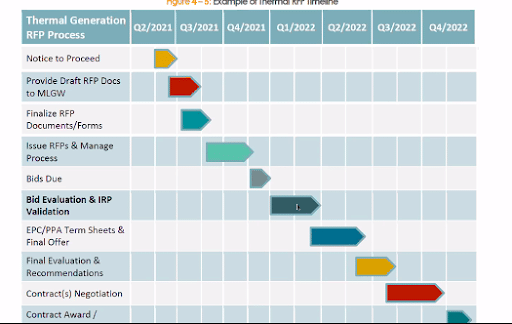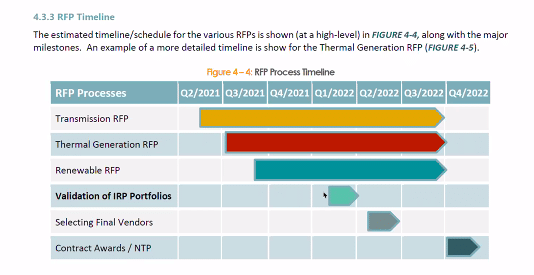Brady Watson, former Civic Engagement Coordinator for the Southern Alliance for Clean Energy, also contributed to this blog post.
UPDATE: At their April 6th meeting, the Memphis City Council voted to approve the issuance of a request for proposals (RFP) in order for MLGW to seek alternative power supply options for Memphis and Shelby County. You can view our statement thanking the Council and MLGW Board here.
At the special called MLGW Board meeting on Wednesday, March 31, the board approved a resolution awarding a contract to GDS associates to oversee the request for proposals (RFP) process where alternative power supply options will be solicited. The contract was for the not-to-exceed amount of $520,000 and was largely the same as the contract the board approved for GDS back in September, with a few modifications including:
- MLGW will make it clear in the RFPs issued that the three recommended portfolios from the Integrated Resource Plan (IRP) are the desired scenarios, but that bidders may include proposals for other methods of providing transmission and generation to Memphis and Shelby County
- GDS and MLGW shall, at a minimum, consider the following in evaluating bids:
- Reliability of transmission and generation compared with present experience
- Economics
- Relevant risks
- Counterparty creditworthiness and counterparty market credibility
- Past performance, etc.
- At Task 8 “Bid Evaluation and Short List” in the Proposed Work Plan, GDS will present to the Board (for information purposes only) a cost comparison analysis of the most competitive and viable bidder proposals to the estimated costs presented in the IRP Portfolio(s) and updated the estimated savings compared to MLGW’s expected power cost from TVA. Members of the Board will have an opportunity to provide feedback on additional areas for evaluation and information requested to be included in any final recommendation to be made to the Board and Council for approval following negotiation and final offers with the shortlist of bidders. Following a presentation to the Board, GDS will make a similar presentation to the City Council for a similar purpose.
- To preserve the integrity of the bid process, the identity of all bidders and the details of individual proposals shall not be shared as part of the presentations in paragraph 3 above.
The timeline for the RFP process is essentially the same as was presented in the fall, just shifted 6 months. GDS expects to have bids for transmission, generation, and market pricing back by the end of 2021, with evaluation and recommendations made by the first quarter of 2022. Visual timelines of the proposed RFP process are below. GDS also indicated they would be conservative in their transmission analysis with the assumption that TVA will NOT be opening up their transmission lines for power wheeling should MLGW give notice to leave TVA. The full text of the recommendation to move forward with the GDS contract can be viewed here. Next, the resolution will go to Memphis City Council for their approval at the April 6 meeting. The meeting can be viewed at this link on that date.


–––––––––––
After a nearly six-month delay, Memphis Light, Gas and Water’s (MLGW) process of identifying alternative sources of power supply got an unexpected restart during the Memphis City Council meeting on Tuesday, March 16. Councilmembers Colvett and Johnson brought forth a resolution to approve MLGW to move forward with a request for proposals to receive bids from potential new power suppliers.
A Study Opened the Door to Potential Savings
Over the past two years, MLGW has been considering its long term energy options and found, after detailed study, that Memphians could save $120 million or more per year while dramatically cutting power plant pollution by switching to a new supply of power rather than their current supplier, the Tennessee Valley Authority (TVA). In order to verify those savings, however, MLGW must receive actual bids from companies that would fulfill the city’s power needs through a process called a request for proposals (RFP). Under Memphis law, MLGW cannot hire a firm to manage the RFP process without the approval of City Council, so while the MLGW board approved a contract for an RFP last fall, City Council withheld its approval in a vote in October of 2020.
Why the Sudden Restart?
There isn’t clarity around why Memphis City Council voted against moving forward with an RFP last fall, nor is there clarity on what the catalyst was to restart the process.
What we do know is that following the extreme weather in Texas, Louisiana, Mississippi, and Arkansas, that led to an energy crisis, TVA launched a PR campaign targeting Memphis to exploit the suffering of many while touting TVA’s reliability. In the aftermath of the crisis and subsequent PR campaign, though not necessarily as a result of it, MLGW CEO, J.T. Young proposed putting an indefinite hold on the search for an alternative energy supply and keeping MLGW under the TVA umbrella. At the March 16 City Council meeting, a representative from the Midcontinent Independent System Operator (MISO), which administers the large energy market just over the Mississippi River, gave a presentation on reliability in MISO and the recent events. Melissa Seymour from MISO cleared up misinformation about MISO’s reserve margin, or the amount of generation above what is needed that is available in case of emergencies, which was approximately 40% for the 2020-2021 winter season. She also clarified that transmission congestion was a major driver of the 2-4 hours of outages that were experienced in parts of MISO territory in Texas, Louisiana, and Mississippi.
Additionally, Memphis Mayor Strickland has come out in support of moving the process of searching for an alternative energy supply for Memphis and Shelby County forward. Mayor Strickland’s interest in involving his administration can be seen in the resolution proposed by Councilmember Johnson at the March 16 City Council meeting.
Resolution to move forward with RFP comes with suggested stipulations
Jumping to the March 16 City Council meeting, Councilmember Johnson indicated when she voted against the contract last year, she did not intend to stop the process, but rather, there were some parts of the proposed contract she disagreed with. The new resolution Councilmember Johnson introduced this week is essentially duplicative of the resolution to approve the RFP contract introduced last year, with a few additional requirements, including:
- The City administration should review and approve the RFP before it is issued and should be a part of the review and selection process of any RFP submission.
- The RFP should clearly outline that submissions should not be limited to the pre-identified energy portfolios through MLGW’s long term planning study, but rather that it is open to any power supply bids
- Establishing a “check-in” at the 7-11 month mark of the RFP process to determine the feasibility of leaving TVA based on initial results
- Requiring, as part of the bid evaluation process, an evaluation of the reliability of the power supplier, including factors such as economic risk analysis, creditworthiness, market credibility, etc.
Who has the authority to move forward and how?
During the meeting, City Council discussed the new resolution and came to the conclusion they did not have the authority to dictate to MLGW the RFP contract. Therefore, instead of sending a resolution to the MLGW Board, Council decided to simply indicate their desire to restart the RFP process to the MLGW Board, and MLGW President JT Young, who participated in the discussion with City Council, indicated he would pass the message along to the MLGW Board. Councilmembers closed the discussion by indicating they would hold on further action likely until their April 6 meeting.
The MLGW Board took up this topic the next day, at their March 17 meeting. First, a vote was held to reject President Young’s prior recommendation that the RFP process be indefinitely suspended and negotiations with TVA commence. That motion passed 3-2, with Commissioners Dickson and McCullough voting “No,” expressing concerns about reliability based on what happened in Texas and other states during the recent winter storms, and Commissioners Wishnia, Graves, and Pohlman voting “Yes.”
Commissioner Wishina then made a motion to enter into a professional services agreement with the firm MLGW had previously selected to run the RFP process, with one contract for power supply and transmission and a separate contract for MLGW self-generation. After some discussion, the board ultimately elected to instead attempt to simplify the process and retain the previous proposal with some of the additional items suggested by City Councilmember Johnson. Of the additional items, board members expressed the most concern around giving the city administration control over the issuance of the RFP, and MLGW legal counsel Cheryl Patterson raised concerns about the 7-11 month timeframe. The board members asked president Young if he could have something for them to vote on in order to send it to City Council ahead of their April 6, and he agreed he could do so. This motion passed unanimously.
A process that has seen bumps in the road now has a clearer path forward
The next step in this process is that MLGW will refresh the contract to carry out the RFP and the MLGW Board will likely vote on this contract in the next few weeks at a specially called meeting. SACE will be following along and will continue to provide updates.
All this is happening amidst a case at FERC and growing national opposition to a crude oil pipeline in Memphis
The Federal Energy Regulatory Commission (FERC) is currently reviewing a case that could open a new option to MLGW and other local power companies: the opportunity to remain a TVA transmission customer while self-generating and/or purchasing power that is not generated by TVA. MLGW should, at the very least, see how FERC decides this case and have the results from an RFP in hand before negotiating or signing a new contract with TVA. The possibility of LPCs buying energy from sources other than TVA could have significant benefits for ratepayers.
Additionally, growing national attention is being drawn to the Byhalia Connection Pipeline, a proposed pipeline that would pump crude oil from Southwest Memphis to Marshall County, Mississippi. Amidst our dire need to rapidly transition from fossil fuels to clean energy and protect our resources like water, there is no place for a project like this that seeks to prolong the era of oil-based transportation.
What does this all mean for MLGW customers as we continue to advocate for lower energy bills and healthier communities?
As we mentioned earlier, the process of MLGW exploring an alternative energy supply has been in the works for over two years. After all the time and resources invested in this process, it’s understandable that many would like to push forward quickly. MLGW has given careful consideration to alternative power supply option, and seeing this process through to its logical conclusion means collecting market pricing from bidders on what it would take for MLGW to build, buy, or contract for the resources it needs to provide reliable service to its ratepayers, without remaining a TVA customer. We continue to believe it is in the best interest of MLGW to issue an RFP for an alternative power supply.
We must remember it is imperative to prioritize Memphians first. In doing so, we can address the energy inequities within the community, and choose a path with cleaner energy.
Join us as we continue to stand up and say Memphis Has the Power!